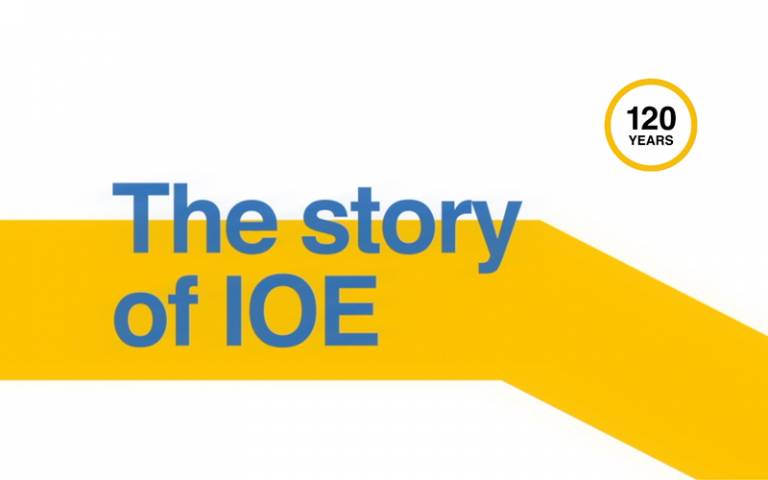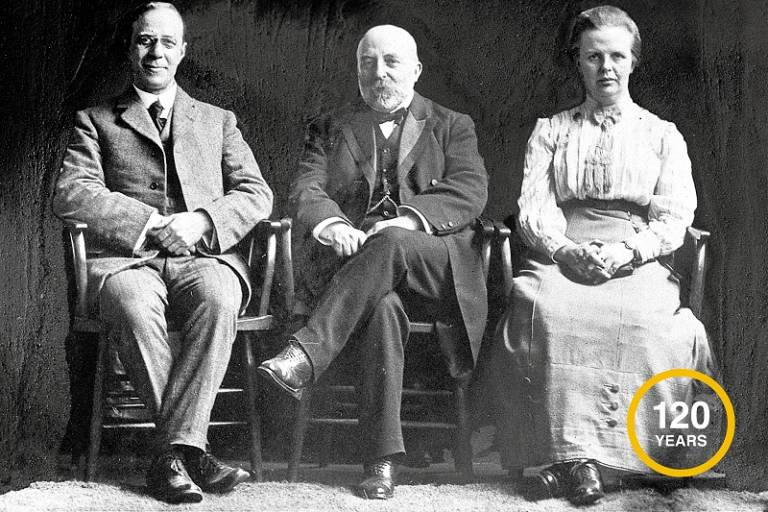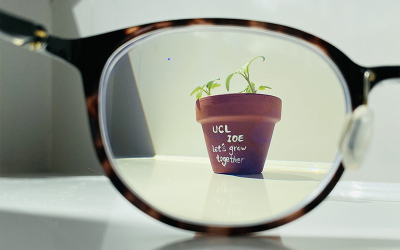Watch our animated timeline featuring key moments in the first 120 years of IOE's history.
Highlights
1902
IOE is founded on 6 October 1902 by the London County Council and University of London as the London Day Training College (LDTC) with 58 students training as elementary school teachers.
1902-22
John Adams is LDTC’s first Principal and the University of London’s first professor of education. He set the LDTC on the path to becoming a fully-fledged faculty of education within the university.
1902-33
Margaret Punnett and Clotilde von Wyss play key roles in the LDTC’s early years. As Mistress of Method and Vice-Principal, Punnett was admired for her efficiency and care for students, while von Wyss was a pioneer of educational broadcasting and film.
1907
LDTC moves to Southampton Row after originally being split across three sites in central London.
1909
LDTC gains an official demonstration school, Cromer Street School, supporting teaching training while serving 290 pupils aged 10-14.
1932
In response to its growing academic reputation, the LDTC is incorporated into the University of London, becoming the University of London, Institute of Education.
1922-36
Percy Nunn is LDTC Principal and latterly IOE Director. Nunn oversaw a significant increase in student numbers, particularly of ex-servicemen post-WWI. Reflecting Nunn’s disciplinary interests, the influential child psychologist, Susan Isaacs, was one of his appointments to IOE.
1936-45
Fred Clarke’s leadership as Director sees IOE emerge from the years of WWII larger and with a higher profile as an international centre for the study of education. The prominent sociologist Karl Mannheim was one of his one of the scholars he brought to IOE, to emphasise the link between education and society.
1938
IOE moves to Senate House, but as WWII broke out it was evacuated to University College, Nottingham to make way for the Ministry of Information. In 1943 IOE returned to London’s Portman Square then Senate House in 1946.
1945-57
George Barker Jeffery’s time as Director sees IOE emerge as the lead for teacher education across London. As the ‘Area Training Organization’ for the Capital IOE oversaw some 30 colleges and departments of education alongside existing activity, together encompassing around 10,000 students.
1958-73
IOE's academic leadership grows further with Lionel Elvin as Director, including through the appointment of England’s first professor of child development and transformative work in the philosophy, psychology and sociology of education, led by scholars such as Reid, Peters, Vernon, Floud and Bernstein.
1960
Plans are formed for IOE’s home at 20 Bedford Way. Denys Lasdun, architect of buildings including the Royal National Theatre on London’s South Bank and the Royal College of Physicians building in Regent's Park, would design IOE’s new Brutalist-style home.
1973-83
William Taylor’s Directorship navigates the national dismantling of Area Training Organizations for teacher education. IOE innovated with a more school-based approach to teacher education, appointed more professors with curriculum specialisms, and established the Thomas Coram Research Unit for research on children and families.
1975
IOE moves to 20 Bedford Way. The building was opened by Her Majesty Queen Elizabeth, The Queen Mother, Chancellor of the University of London on 8 December 1977.
1983-89
Denis Lawton’s time as Director sees national reforms to teacher education bringing greater emphasis on school partnerships and placements, an approach IOE had helped to shape. IOE also developed a greater presence in vocational education.
1987
IOE gains its own Royal Charter, establishing it as an autonomous college of the University of London, to be known as the Institute of Education, University
of London.
1989-94
Under Peter Newsam as Director, IOE by now welcomes some 3,000 students from over 80 countries. The Social Science Research Unit was established, and what is still regarded as Europe’s best education library found its home.
1994-2000
As Director, Peter Mortimore oversees the introduction of a Doctoral School and EdD and DEdPsy degrees at IOE, as well as three prestigious government research centres on evidence-based education policy and practice. Two of Britain’s internationally-renowned birth cohort studies joined IOE, in the Centre for Longitudinal Studies.
2000-10
IOE’s path to recognition as the world’s leading school of education is set by Geoff Whitty as Director. Additions included the Knowledge Lab, on educational technology, and MBAs in higher education and school leadership. Many networks and collaborations were formed with partners internationally, and new sites acquired at Emerald Street and Endsleigh Gardens.
2002
The IOE celebrates its centenary with the launch of a book about its history and a Centenary Scholarship Fund for international students. It was an occasion to reflect upon the quality and commitment of its students and staff to IOE’s mission to improve lives through education.
2007
IOE gains the power to award its own degrees, having previously awarded University of London degrees.
2011-15
As Director, Chris Husbands sees IOE ranked #1 for Education in the QS World University Rankings by Subject, ‘Outstanding’ Ofsted ratings for IOE’s initial teacher education, and recognition for its research in the 2014 Research Excellence Framework.
2014
IOE and University College London (UCL) merge on 2 December 2014. IOE became known as the UCL Institute of Education. Now part of a multi-faculty university, IOE focused on growing its undergraduate offer and building cross-disciplinary work across the full range of higher education.
2015
IOE is awarded the Queen’s Anniversary Prize for higher and further education, the most prestigious form of national recognition open to a UK academic institution.
2016-20
Director Becky Francis reaffirms IOE’s social justice mission, launching research centres on education and equalising opportunities, and teachers and teaching. IOE held its #1 status for Education in the QS World University Rankings and begun a major modernisation project of 20 Bedford Way, completing the first phase in 2019.
2020-21
Interim Director Sue Rogers leads IOE in a period dominated by the COVID-19 pandemic, as IOE mobilised to support its own students, help shape UCL’s successful teaching and learning response to the crisis, and address urgent research questions arising from the pandemic.
2021-present
Li Wei leads as IOE Director at a time when global challenges present themselves with fresh urgency, providing new impetus to IOE’s mission to redress inequalities and improve lives.

 Close
Close



